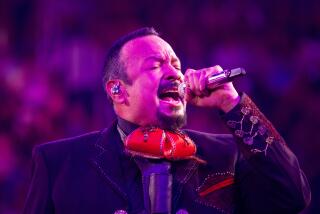POP MUSIC REVIEW : Argentine Facundo Cabral: a Hard Man to Categorize
The one certainty about Facundo Cabral’s performance Friday at the Variety Arts Theater is that his art defies even the simplest definitions.
You might, if hard-pressed for a North American equivalent, liken the Argentine singer-songwriter-poet to Garrison Keillor, former host of radio’s “A Prairie Home Companion.” When viewed from a great distance, both performers sing songs and spin stories about the lives of humble, simple, small-town folk.
That’s where the similarities end, however. The garrulous Cabral, unlike Keillor and his fictional Minnesota town, speaks of real places and people, a life of poverty in which he spent several years as a runaway, and, after 17 hard years, experienced a religious conversion when he discovered the New Testament’s “Sermon on the Mount.”
Even when viewed within a Latin-American context, the 51-year-old performer remains the quintessential eccentric. Although his more than two-hour concert--performed entirely in Spanish--was imbued with the bittersweet melancholy and gently galloping rhythms of the Argentine milonga song style , Cabral doesn’t consider himself a proponent of Nueva cancion, or new song movement of social protest harnessed to traditional folk music.
Instead, Cabral has said in interviews that he believes his music has anticipated several social and artistic movements and styles, from liberation theology to the “testimonial” or biographical novels of writers such as Nicaragua’s Omar Cabezas, the Sandinista guerrilla who learned to write and then record his revolutionary ordeal in the mountains.
Now, with his current U.S. tour and upcoming U.S. release of “Facundo Cabral Secreto,” the latest of his more than 80 albums (which nearly equals the number of times he has been detained by police in Argentina), it remains to be seen if his art works outside of its cultural context. (Friday’s concerts drew near-capacity audiences in the 900-seat hall.)
The innovation of Cabral’s canto testimonial performance exceeds the content of his poems and songs by blurring conventional boundaries between artistic disciplines. Friday, Cabral wove fragments of poetry with seamless commentary interrupted only by applause.
“He’s a difficult artist to grasp,” said Angela Velasquez, an Argentine and longtime fan who lives in Pasadena. “He only appeals to a small audience, but I have always liked his literature, his poetry, his way of seeing the world through his music.”
At the core of his artistic vision is his radical--even, in some ways, profoundly conservative--image of Christ as the God of justice and of the poor, and a faith that the kingdom of heaven can be achieved on Earth. Paradoxically, however, Cabral challenges Latin Americans on both the left and the right to take responsibility for decades of military dictatorships:
“For fearful people there will always be dictators,” he interjected in the middle of a song. “And the boss can only exist if there are downtrodden.”
But the lanky performer was too eclectic, too anarchic to confine his notions of spirituality. Like a strange cross between the epigrammatic Heraclitus and the painedly irreverent Lenny Bruce, Cabral followed an hilarious ode to masturbation with a poem elaborating his bitingly sarcastic theory of the origins of war:
War belongs to the white-skinned people
Who sent the black-skinned people
To fight with the yellow-skinned people
To defend the land they stole
From the red-skinned people.
Still, there were moments when Cabral’s performance seemed like so much capricious posturing. You were never quite sure if you were in the presence of a sage or a charlatan. This ambivalence, in the end, may be the best evidence of Cabral’s knack for rattling comfortable assumptions.
More to Read
The biggest entertainment stories
Get our big stories about Hollywood, film, television, music, arts, culture and more right in your inbox as soon as they publish.
You may occasionally receive promotional content from the Los Angeles Times.










